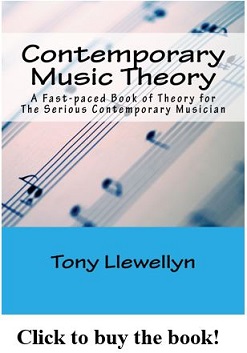Contemporary Music Theory
Pursuing Excellence
Personal Development
Leadership Principles
Administrative Skills
Contemporary Music Theory

"What?" you ask. "Music theory! Do I really have to learn theory?"
I know what you're saying. For a lot of musicians, theory is about the dirtiest word in the English vocabulary.
And I know why. They're thinking, But music is art. It's all about expressing emotion and tapping into your feelings.
And that's so true. But what a lot of people don't understand is that theory can be your friend.
I know what some of you are thinking. Yeah, right! I remember doing theory when I was a kid. It's all about learning Italian terms like allegro and andante. It's about understanding binary, ternary and rondo form. It's learning the rules of four-part harmony, consecutive fifths and octaves. In short, it's irrelevant to the kind of music I play.
I understand your frustration. Many of the rules that we learned in classical theory are broken all the time in contemporary music.
Nevertheless, as I said, theory be your friend. As long as you learn the right kind of theory, the kind that's relevant to modern music. Think of music theory as the framework that helps you in the expression of your art
For instance, guitarists are famous for not knowing how to read music and being great at playing by ear. You've probably heard the joke: How do you shut a guitarist up? Put written music in front of him. An insult, to be sure, but largely true.
But say you're a guitarist and someone asks you to accompany them as a vocalist, you'll want to know the key of the song. That's theory. You'll want to know the chords. That's theory. You'll want to understand the style, whether to use straight majors and minors, or change them into 7ths and 9ths. That's theory. If you're to play lead guitar, you'll want to know if there are any chords that don't belong in the key. That's theory too.
In fact, there's a whole bunch of theory that you already take for granted that you need to know. You've just absorbed it along the way and accepted that you need to know it to be a good musician.
Well, this section on contemporary music theory is all about equipping you with the necessary knowledge and understanding so that you can be an even better musician.
And BTW, you don't have to be able to read music to get through this stuff. Just click below on the topic that interests you. But if you don't have much of a grounding in music theory, I suggest you start at the beginning and take in the basics, otherwise you might struggle to understand what's being said.
Understanding Scales | Understanding Chord Structure | Understanding Diatonic Chords | Understanding Minor Scales | Diatonic Chords in Minor Keys | Scale Degree Names | Chord Substitution - Extended Chords | Chord Substitution - Overlapping Chords | Improvisation - Arpeggios | Improvisation - Major Scales | Improvisation - Pentatonic Scales | Improvisation - Blues Scales